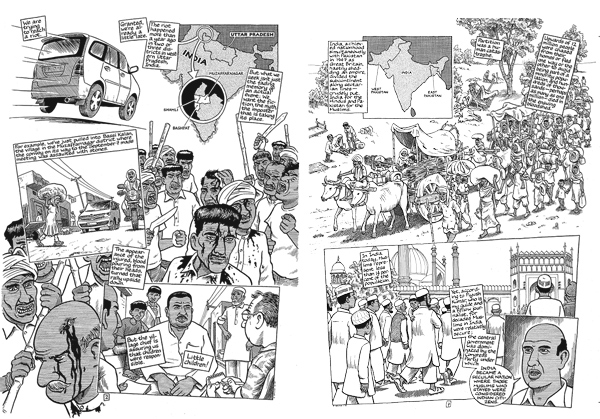CONTESTS OF STRENGTH
In 1699, Dushuuw is a battle-hardened warrior in Wuh-uhch, where his father, Chahbuhť̓, is a powerful and revered whaling chief. At 19, he’s the youngestson in his family and grows up in the shadow of his 22-year-old brother, Q̓otsik, who’s established himself as a prodigious whaler who’s likely to succeed Chahbuhť̓ one day. Dushuuw’s position within the tribe is compromised when he catches a man, Wiikihbis, having sex with his wife, and kills him. The marriage is a strategic one, cementing an important alliance, so the political fallout is considerable. Moreover, the man he killed was a whaler on Q̓otsik’s canoe, and now he must take his place—a job he doesn’t relish, and for which he possesses little natural talent; it’s a predicament that Slager portrays with great psychological subtlety and dramatic power. Meanwhile, Amuun’ax̱sum, the daughter of another whaling chief,is taken hostage by an invading tribe after they murder her mother and father. She’s later enslaved by Eekbis, the shaman of Dushuuw’s tribe. She longs to recapture the nobility that she now must hide to stay alive. Amuun’ax̱sum and Dushuuw fall in love, but their prospects for happiness seem dim, given the social expanse that separates them. Also, a disastrous earthquake and tsunami threatens to end their lives before they can make a bid for romantic bliss. Slager’s novel is based on the Makah tribe, who live in the Cape Flattery area of what is now Washington state, and she brings the everyday lives and customs of its people into vivid relief. The natural disaster that waylaid the tribe is a real one, with her research into it and scholarly command of all the relevant source material nothing short of magisterial. Readers get a remarkable glimpse into a whaling community before European contact. However, this book is, first and foremost, a novel, and it tells an engrossing story. Both the principal characters are portrayed with notable nuance, and their budding relationship is both plausible and moving. Some people in Dushuuw’s tribe wonder if he’s more trouble than he’s worth, due to his taste for violence: “A man who takes that much human life—perhaps the spirit of the whale cringes from it, you see?” Dushuuw hears an elderly man say. “Is there really a way to get rid of so much human stench, such darkness of heart?” Amuun’ax̱sum also proves to be a compelling character, and Slager depicts the burden of her grief—over the loss of her family, and of her noble identity—with affecting complexity: “She wanted to fill a river with tears, and shoot her fear to the moon. She wanted a bench, not a mat. To own things, not hide them. A home. A voice. A name—to be known.”


In 1699, Dushuuw is a battle-hardened warrior in Wuh-uhch, where his father, Chahbuhť̓, is a powerful and revered whaling chief. At 19, he’s the youngestson in his family and grows up in the shadow of his 22-year-old brother, Q̓otsik, who’s established himself as a prodigious whaler who’s likely to succeed Chahbuhť̓ one day. Dushuuw’s position within the tribe is compromised when he catches a man, Wiikihbis, having sex with his wife, and kills him. The marriage is a strategic one, cementing an important alliance, so the political fallout is considerable. Moreover, the man he killed was a whaler on Q̓otsik’s canoe, and now he must take his place—a job he doesn’t relish, and for which he possesses little natural talent; it’s a predicament that Slager portrays with great psychological subtlety and dramatic power. Meanwhile, Amuun’ax̱sum, the daughter of another whaling chief,is taken hostage by an invading tribe after they murder her mother and father. She’s later enslaved by Eekbis, the shaman of Dushuuw’s tribe. She longs to recapture the nobility that she now must hide to stay alive. Amuun’ax̱sum and Dushuuw fall in love, but their prospects for happiness seem dim, given the social expanse that separates them. Also, a disastrous earthquake and tsunami threatens to end their lives before they can make a bid for romantic bliss.
Slager’s novel is based on the Makah tribe, who live in the Cape Flattery area of what is now Washington state, and she brings the everyday lives and customs of its people into vivid relief. The natural disaster that waylaid the tribe is a real one, with her research into it and scholarly command of all the relevant source material nothing short of magisterial. Readers get a remarkable glimpse into a whaling community before European contact. However, this book is, first and foremost, a novel, and it tells an engrossing story. Both the principal characters are portrayed with notable nuance, and their budding relationship is both plausible and moving. Some people in Dushuuw’s tribe wonder if he’s more trouble than he’s worth, due to his taste for violence: “A man who takes that much human life—perhaps the spirit of the whale cringes from it, you see?” Dushuuw hears an elderly man say. “Is there really a way to get rid of so much human stench, such darkness of heart?” Amuun’ax̱sum also proves to be a compelling character, and Slager depicts the burden of her grief—over the loss of her family, and of her noble identity—with affecting complexity: “She wanted to fill a river with tears, and shoot her fear to the moon. She wanted a bench, not a mat. To own things, not hide them. A home. A voice. A name—to be known.”

























![How To Drive More Conversions With Fewer Clicks [MozCon 2025 Speaker Series]](https://moz.com/images/blog/banners/Mozcon2025_SpeakerBlogHeader_1180x400_RebeccaJackson_London.png?auto=compress,format&fit=crop&dm=1750097440&s=282171eb79ac511caa72821d69580a6e#)

![Brand and SEO Sitting on a Tree: K-I-S-S-I-N-G [Mozcon 2025 Speaker Series]](https://moz.com/images/blog/banners/Mozcon2025_SpeakerBlogHeader_1180x400_LidiaInfante_London.png?auto=compress,format&fit=crop&dm=1749465874&s=56275e60eb1f4363767c42d318c4ef4a#)
























![The 11 Best Landing Page Builder Software Tools [2025]](https://www.growthmarketingpro.com/wp-content/uploads/2024/04/best-landing-page-software-hero-image-1024x618.png?#)






































![How to Create an SEO Forecast [Free Template Included] — Whiteboard Friday](https://moz.com/images/blog/banners/WBF-SEOForecasting-Blog_Header.png?auto=compress,format&fit=crop&dm=1694010279&s=318ed1d453ed4f230e8e4b50ecee5417#)
![How To Build AI Tools To Automate Your SEO Workflows [MozCon 2025 Speaker Series]](https://moz.com/images/blog/banners/Mozcon2025_SpeakerBlogHeader_1180x400_Andrew_London-1.png?auto=compress,format&fit=crop&dm=1749642474&s=7897686f91f4e22a1f5191ea07414026#)


























![Brand pitch guide for creators [deck and email templates]](https://blog.hootsuite.com/wp-content/uploads/2022/06/brand-pitch-template.png)



















![The Largest Communities on Reddit [Infographic]](https://imgproxy.divecdn.com/vfTS-YsC_ZrqM6F4tAXJgV6qj3gCHSsf2dvHufDbrrQ/g:ce/rs:fit:770:435/Z3M6Ly9kaXZlc2l0ZS1zdG9yYWdlL2RpdmVpbWFnZS9sYXJnZXN0X3JlZGRpdF9jb21tdW5pdGllczIucG5n.webp)






